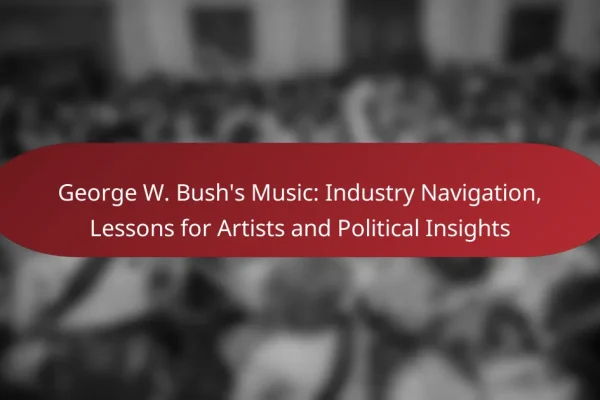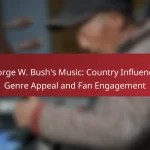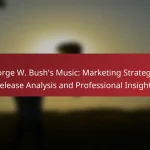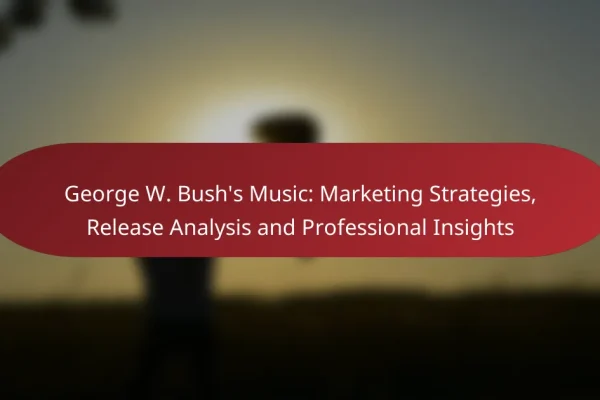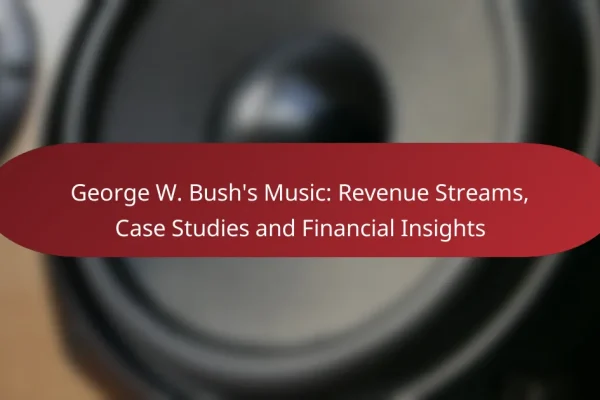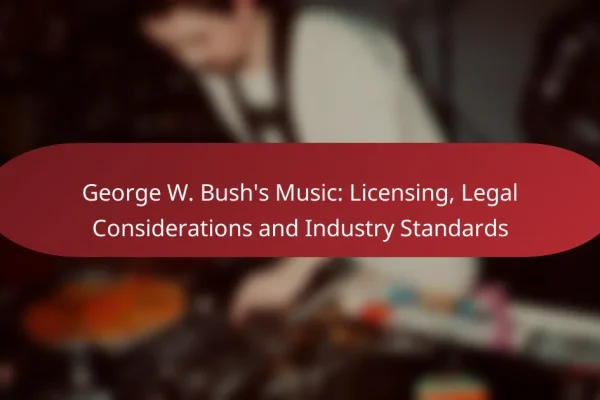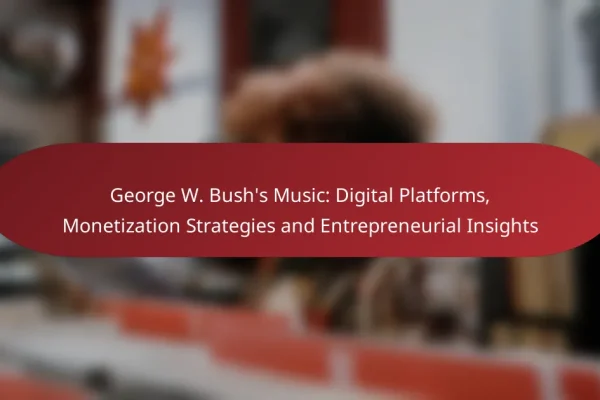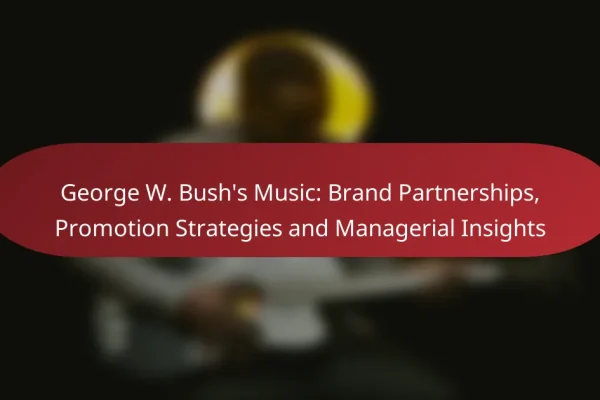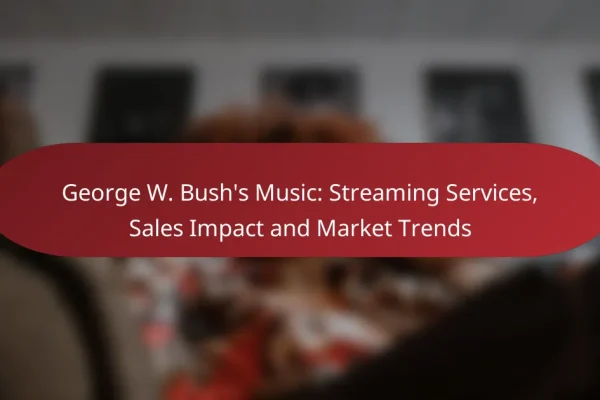How can political figures leverage music for campaigns?
Political figures can leverage music for campaigns by using it to connect emotionally with voters and enhance their message. Music can create memorable experiences and foster a sense of community, making it a powerful tool in political outreach.
Engaging voters through music events
Hosting music events allows political figures to engage directly with voters in an enjoyable setting. These events can range from concerts featuring popular local artists to smaller gatherings with live performances. Such interactions can help humanize candidates and create a positive association with their campaign.
To maximize impact, consider targeting specific demographics by selecting genres that resonate with particular voter groups. For example, a country music event might attract rural voters, while a hip-hop concert could engage younger audiences.
Using music in political advertisements
Incorporating music into political advertisements can significantly enhance their emotional appeal and memorability. A well-chosen song can evoke feelings that align with a candidate’s message, making the ad more persuasive. For instance, uplifting music can inspire hope, while somber tones might underscore serious issues.
When selecting music for ads, ensure it is legally licensed to avoid copyright issues. Additionally, consider the cultural context; a song that resonates in one region may not have the same effect in another.
Collaborating with artists for endorsements
Collaborating with well-known artists can provide political figures with credibility and access to broader audiences. Endorsements from popular musicians can attract media attention and sway undecided voters, especially among younger demographics who may be fans of the artist.
When seeking endorsements, choose artists whose values align with the campaign’s message. Authenticity is key; voters are more likely to respond positively if they believe the artist genuinely supports the candidate.
What digital products support music in politics?
Digital products that support music in politics include music streaming platforms and online concert platforms. These tools enable political figures to engage with their audience, promote their campaigns, and raise funds through music-related initiatives.
Music streaming platforms for campaign playlists
Music streaming platforms like Spotify and Apple Music allow political figures to create curated playlists that resonate with their campaign themes. These playlists can help establish a connection with voters by showcasing the candidate’s personality and values through song choices.
When using streaming platforms, consider the target audience and select tracks that align with their preferences. Engaging with popular or trending songs can enhance visibility, while original campaign songs can create a unique identity. Ensure that the playlists are easily accessible and promoted through social media channels.
Online concert platforms for fundraising
Online concert platforms such as YouTube Live and Twitch provide opportunities for political figures to host virtual fundraising events. These platforms enable candidates to perform live music or collaborate with artists, attracting supporters and generating donations in real-time.
To maximize fundraising efforts, promote the event well in advance and leverage social media for outreach. Set clear donation goals and provide incentives for contributions, such as exclusive merchandise or virtual meet-and-greets. Ensure that the technical aspects, like streaming quality and engagement features, are well-planned to create a memorable experience for attendees.
How does music influence political messaging?
Music significantly shapes political messaging by evoking emotions and creating memorable associations. Campaigns often utilize songs to enhance their messages, connect with voters, and reinforce their brand identity.
Emotional resonance in campaign songs
Campaign songs are carefully chosen to resonate emotionally with target audiences. They can evoke feelings of hope, nostalgia, or urgency, which can motivate voters to engage with a candidate’s message. For example, an upbeat anthem may inspire enthusiasm, while a poignant ballad might reflect shared struggles.
When selecting a campaign song, consider its lyrical content, tempo, and cultural relevance. A song that aligns with the candidate’s values and the electorate’s sentiments can strengthen the emotional connection and enhance voter turnout.
Historical examples of music in political movements
Throughout history, music has played a pivotal role in political movements. For instance, during the civil rights movement in the United States, songs like “We Shall Overcome” became anthems of hope and unity, galvanizing supporters and spreading messages of equality.
Another notable example is the use of “Born to Run” by Bruce Springsteen during Barack Obama’s 2008 campaign, which captured the spirit of change and resonated with younger voters. These examples illustrate how music can amplify political messages and mobilize communities around shared goals.
What are the best practices for music licensing in politics?
Best practices for music licensing in politics involve understanding copyright laws, negotiating with rights organizations, and ensuring compliance with regulations. Political figures must secure the necessary permissions to use music in campaigns, events, and advertisements to avoid legal issues and potential fines.
Understanding copyright laws
Copyright laws protect the rights of creators, meaning that using music without permission can lead to legal consequences. Political figures should familiarize themselves with the basics of copyright, including the distinction between public domain works and those that require licensing.
In the U.S., for example, using a song in a campaign ad typically requires a synchronization license, while public performances may need a different type of license. It’s crucial to determine the specific rights needed based on how the music will be used.
Negotiating with music rights organizations
Negotiating with music rights organizations is essential for obtaining the necessary licenses. Organizations like ASCAP, BMI, and SESAC manage the rights for many popular songs and can provide guidance on the licensing process.
When negotiating, be clear about the intended use of the music, the duration, and the scope of the campaign. It’s advisable to start discussions early, as licensing can take time and costs can vary significantly based on the song’s popularity and the intended reach of the campaign.
How can political figures measure the impact of music?
Political figures can measure the impact of music through various methods, including analyzing audience engagement metrics and surveying voter sentiment after events. These approaches provide insights into how music influences public perception and voter behavior.
Analyzing audience engagement metrics
Audience engagement metrics are essential for understanding how music resonates with listeners. Political figures can track social media interactions, streaming numbers, and attendance at events to gauge interest and emotional response. For example, a spike in social media mentions during a campaign rally featuring a popular artist may indicate a positive connection with the audience.
Key metrics to consider include likes, shares, comments, and overall reach. Monitoring these figures over time can help identify trends and assess which musical elements are most effective in engaging supporters.
Surveying voter sentiment post-events
Surveying voter sentiment after music-infused events is a direct way to measure impact. Political figures can conduct polls or focus groups to gather feedback on how the music influenced attendees’ perceptions of the candidate or campaign. Questions might include how the music made them feel or if it changed their opinion about the political message.
Timing is crucial; surveys should be administered shortly after the event to capture immediate reactions. Additionally, comparing results across different events can reveal which musical styles or artists resonate best with specific demographics, helping tailor future campaign strategies.
What are the challenges of using music in political campaigns?
Using music in political campaigns presents several challenges, including managing public perception and navigating controversies with artists. These factors can significantly influence voter engagement and the overall effectiveness of a campaign.
Managing public perception
Public perception is crucial when incorporating music into political campaigns. The choice of songs and artists can evoke strong emotions and associations, which may align or clash with a candidate’s message. Campaigns should carefully select music that resonates positively with their target audience while avoiding polarizing figures.
To effectively manage public perception, campaigns can conduct surveys or focus groups to gauge audience reactions to specific songs or artists. This feedback can guide decisions and help avoid potential backlash. Additionally, transparency about why certain music is chosen can foster a sense of authenticity.
Navigating controversies with artists
Controversies with artists can arise when a political campaign uses their music without permission or when the artist publicly disagrees with the candidate’s views. Such situations can lead to negative publicity and damage the campaign’s credibility. It is essential for campaigns to secure proper licensing and ensure that artists are on board with their music being used.
To navigate these controversies, campaigns should proactively communicate with artists and their representatives. Establishing clear agreements and respecting artists’ boundaries can prevent misunderstandings. Additionally, campaigns should be prepared to pivot to alternative music choices if an artist publicly distances themselves from the campaign.
